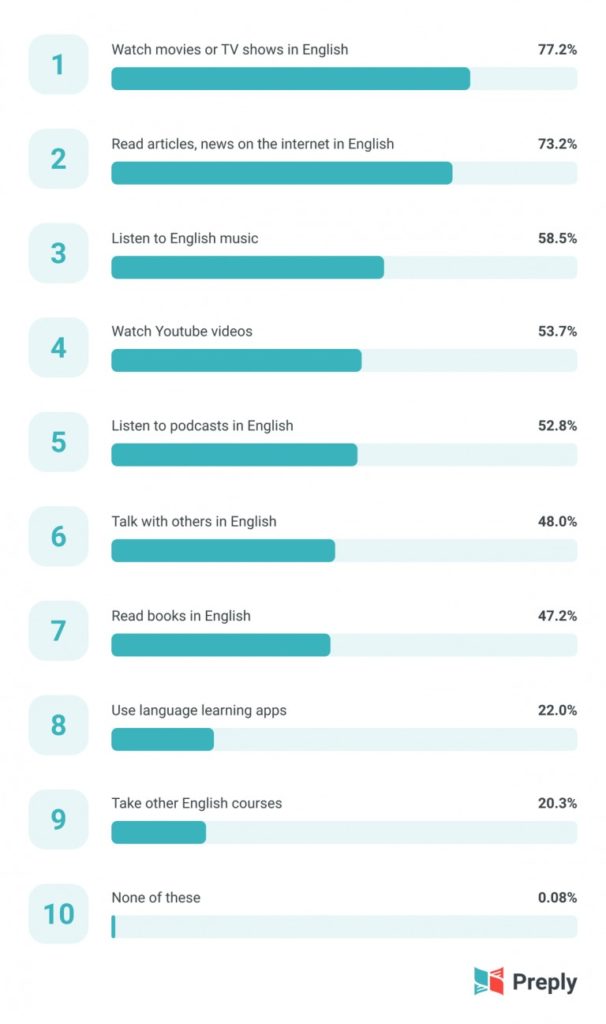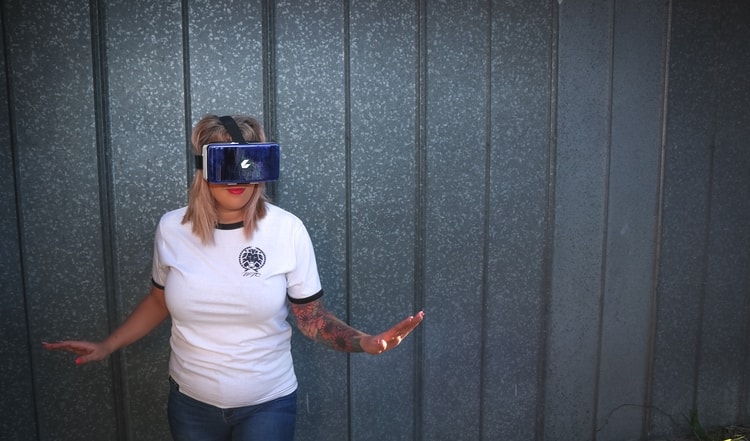The worst part of learning a language is that it can sometimes get boring. But what if you didn’t have to be? With this (not-so-secret) tool, you can throw boredom out the window! Instead, learn a language by watching TV and movies. Sit back, relax, and press play… but first, read these tips so you can make your practice as relaxing and efficient as possible!
If you’d rather go hands-free, you can also listen to this content on the MosaLingua Language Lab podcast:
Listen to “#62 – How To Learn Languages With Movies and TV Shows” on Spreaker.
How to Learn a Language with TV and Movies: A TV Guide to Learning Languages
Whether you’ve recently moved abroad or are just interested in learning a language independently from home, this guide is for you! The key to beating boredom and learning a language efficiently? The answer may, in part, rest within your television.
Watch and Learn
The average Brit spends a staggering 10 years of their life watching television. So it only makes sense for screen-gazers and TV lovers to put this time to good use by using television as an educational tool.
Watching TV to learn a new language can be a fun way of absorbing local lingo and even slang. Similarly to the way you learn a language when you’re surrounded by it and constantly hearing it, watching programs and films in the country’s native tongue can help expand your understanding of the language of your new home or the place you dream of visiting.
Can I really learn a language by watching TV series and movies?
It’s not so outlandish an idea. But there are good and bad ways to go about it.
Luca says… “I’ve been using movies and series to learn languages for years. Without Friends, my English definitely would not have gotten better as fast as it did during my university years. But before moving on, I need to tell you something straight up: if you think that you can learn a language just by watching a movie or a TV show, you’re going to be disappointed. This method really works if you are going to use it as a complementary tool and if you already have some basic skills.”

And he definitely isn’t alone in practicing it. In fact, according to a survey by Preply, of all of the language activities out there, watching movies or TV shows in English is learners’ favorite.
Other than deciding which genres to watch, there are other things you need to think about when approaching language learning via TV. For example, before you even attempt to pick up the remote, make sure you’ve created the right environment for learning – with a comfortable chair, plenty of light, and a pen and paper. Many people watch TV as a way to unwind, but in this instance, you’ll need to be switched on and ready to learn.
Here are a few ways you can make sure learning a language by watching TV series and movies is as fun and effective as possible. They can work for expats, people on extended stays in far off climes, or learners who prefer to stay in their own living room.
Revisit Old Favorites: Subs or Dubs?
In case you’ve not heard of that terminology before, dubs and subs refer to the difference between dubbing over a movie or TV show – recording new voiced dialogue in another language – or subtitling the speech and written plot points with readable translations that appear on screen.
Watching a movie you love so much you practically know it line for line is a good way of getting some practice in.
Luca says… “Start with movies and series you already know quite well. Of course it’s easier to understand a movie or an episode of a TV show that you’re already familiar with. This way, you know it will keep your interest. And you will already have some idea of the plot, so you will be never completely lost.“
Sift through the language options on a DVD or streaming service to watch the movie with subtitles. Keep the film in its original language and correlate the words that appear on screen to the dialogue you know and love. That way, you can pick up new words in a new language fast. Beloved movies and TV shows and movies in a given country often have a popular cultural element. They can even impact local slang, so knowing what’s hot and what’s not can help you in more ways than one.
Once you’ve mastered the subtitle technique, you have the freedom to work out which genre(s) suit you the most. You may find yourself adapting to the language faster through action films, or perhaps sitcoms are your outlet. There’s only one way to find out!
The subtitle technique
Subtitled media is a great way of exploring popular films and shows in the culture you’re immersing yourself in. Here are some recommendations if you want to take this route:
Luca says… “If you are a beginner it’s okay to start with subtitles in your native language. But as soon as you can, switch to subtitles in your target language. Spend as much time in this phase as you need to, and when you feel ready, turn off the subtitles altogether.”
- The best way to begin is by watching programs in your target language, using subtitles in your mother tongue. This will help you to start connecting familiar words to their foreign counterparts.
- Once you’re comfortable with this method and starting to feel more confident, switch to subtitles in the new language, too. This will test your listening skills and help you to differentiate words one at a time.
Luca says… “Do not read the subtitles all the time. You will have to resist the temptation to constantly read the subtitles. Train yourself to only use them as a visual aid. Otherwise, this method is fairly useless.”
- Next, find a program you’re already familiar with, and watch it with no subtitles at all. This should help you to slowly yet surely relinquish your language training wheels.
Luca says… “At the beginning it’s totally normal to have some trouble following along. This is a feeling you’ll just have to get used to. As long as you understand roughly half of what’s going on, you’re doing just fine. Eventually your brain will learn how to guess what is going on based on context clues.“
- Feel free to watch one episode two or three times, once for each stage of this technique.
The dubbing debate
What about dubbed programs or films?
Luca says… “In general, we really recommend banning dubbed movies and TV shows. If your goal is to improve your listening comprehension, you’re not going to make much progress toward it if you only listen to movies and TV in your native language… You also won’t be able to match up correct pronunciation with written words, which could result in some bad pronunciation habits. It’s only logical.”
That said, in some rare cases, it might be okay. For native English speakers, it can sometimes be difficult to find suitable content in your target language. (Although if you have internet access, you have no excuse!) For example, if you’re living in a foreign country and don’t have internet, make do with what you do have. You may have to rely on what’s available on foreign TV. Which often ends up being English-language shows and movies dubbed in the local language.
You can still usually turn on English subtitles or closed captions, but they’ll be accompanied by dubbed language over your beloved characters’ voices. They’ll be speaking aloud in your new local language, but you’ll have English subtitles to read and correspond words to. This can help you pick things up faster than you might think. Although you need to pay close attention when watching even familiar movies this way.
Keep It Grounded in Reality
While it might be tempting to watch Star Wars in Spanish or Game of Thrones in Tagalog, the more inventive genres of movie and TV fiction unfortunately offer far fewer practical linguistic lessons.
You might want to manage your expectations, and dumb down your TV viewing habits if you’re usually into this kind of far-reaching fiction. Methods like the Telenovela Technique encourage us to switch our viewing habits to the more lovable, cheesy fare that makes picking up plot points and the language that goes with them easier.
Sitcoms are another great option. The likes of Friends and Seinfeld have proven superb ways for people learning a new language to pick up on everyday speech and idioms. Whether you’re a Friends fanatic or a Modern Family addict, having a prior understanding of what happens in each episode can also help you to piece together what the characters are saying.
Luca says… “As always, try to practice with regularity. Series are great because you can watch an episode every day, since each one only lasts 25-50 minutes. You won’t lose focus or get overwhelmed. For advanced learners, I recommend watching 2-3 movies per week.”
Adding to this, expressive facial expressions and exaggerated physical gestures that are so common in comedies can also help you figure out what’s being said. With most of us binge watching these shows anyway, for better or worse, why not make it educational?
You Don’t Need to Act Your Age
One technique that works well, though it doesn’t always prove a popular choice with everyone, is watching foreign language children’s TV shows. Ask any parent, and they’ll tell you in weary and beleaguered tones, exactly how much they know about kids TV, the relationships between the main characters, major plot arcs and running themes of the work, etc. But if you’re looking to learn a new language, this kind of entertainment might be just what you need.
That’s because these junior shows have been designed, in part, to help kids learn words for themselves, as well as context of when to say certain things, which words are rude or hurtful to say, and so forth.
Don’t be shy in switching Sesame Street for Plaza Sesamo, and don’t feel like these shows are only for kids, either. You’ve got a free pass to revisit your inner child when picking up a new language from your TV. And you will likely find children’s entertainment easier to follow at first, when you’re still coming to grips with a new kind of dialogue.
What Else Can I Watch?
Ultimately, watch whatever you’re interested in. After all, if you’re going to learn a language by watching TV and movies, it should always be entertaining.
Actions speak louder than words
Once you’ve come to grips with learning parts of a new language via kids’ TV and sitcoms, try to move onto something more action-packed. A little more complex, action films should start to test your comprehension, as the language will be far more varied.
Following the plot shouldn’t be too difficult, as action movies tend to be quite formulaic. If you’re familiar with Taken, starring Liam Neeson, for example, understanding the dialogue in another language should be pretty straightforward. Although, you may have to watch out for uncommon words and phrases which are used to describe weird and wonderful pieces of tech, or code words, for example. In other words, good luck…
Luca says… “Do not look up words while watching, as tempting as it is. If you hit the pause button too frequently, you’ll get bored. Your movie or TV show will end up dragging on for way too long. And you could even end up resenting this activity you love. If you want, you can keep a notepad next to your popcorn instead. Write down some words and expressions you would like to look up afterwards.”
Everybody loves a little drama
Drama shows and films are possibly the most difficult to understand and follow, as they tend to be more sophisticated linguistically than other genres.
The language used in the drama genre often incorporates irony, subtle humor, sarcasm and often culturally specific words that you’ll need to look into. If you’re feeling particularly confident, try watching a drama in your new language to help you learn colloquialisms.
Luca’s Tips for How to Learn a Language by Watching TV and Movies
To hear all of Luca’s tips on how to learn a language by watching TV and movies in one place, check out this video he made.
By the way, have you subscribed to our YouTube channel yet? We have tons more tools, tips, and surprises for you there!
Getting Comfortable
If you’ve chosen to learn a new language because you are planning to live abroad (or are already there), this is a great technique. While it may not seem like it initially, learning a new language and getting acquainted with a new local culture and its customs is as important as the more practical parts of relocation, such as applying for the correct visa and getting a health insurance policy set up.
And if you’re just trying to learn a new language for pleasure, and are doing it from your home country, this can also be a great technique. Hopefully you’ll find that having fun while learning a new language makes the entire process far less daunting. There are naturally going to be times in which you’re bowled over by the complexities of the new language, but these will pass. Soon enough you’ll have ample chance to converse like a local, by combining fun ways to learn in your downtime with a more structured, traditional approach to learning a new language.
Get Started – Suggestions for TV Shows and Movies to Use to Learn a Language
Here are some of our recommendations. Pick your target language and a format:
Spanish
- Spanish TV Shows for Learners
- Best Spanish Movies on Netflix for Learners
- Best Spanish Movies with Subtitles
French
German
Italian
Portuguese
English
- English TV Shows for Learners
- American English Movies for Learners
- British English Movies for Learners
Thanks for reading! Take care and have fun!
About the Author: This post was written in collaboration with Sabrina Bucknole.
Related posts:
Want to start improving your language skills today?
Start learning a new language today

Good news: we can help!
More good news: you can get started for free! Start your free trial now and for the next 15 days, take advantage of the most effective language learning method on the market!
Vocabulary flashcards, videos with subtitles, audiobooks, articles adapted to your level – with MosaLingua Premium (Web & Mobile), you’ll have access to all this and more. Get started right now. It’s free—and risk-free—to try!

 Luca says… “I’ve been using movies and series to learn languages for years. Without Friends, my English definitely would not have gotten better as fast as it did during my university years. But before moving on, I need to tell you something straight up: if you think that you can learn a language just by watching a movie or a TV show, you’re going to be disappointed. This method really works if you are going to use it as a complementary tool and if you already have some basic skills.”
Luca says… “I’ve been using movies and series to learn languages for years. Without Friends, my English definitely would not have gotten better as fast as it did during my university years. But before moving on, I need to tell you something straight up: if you think that you can learn a language just by watching a movie or a TV show, you’re going to be disappointed. This method really works if you are going to use it as a complementary tool and if you already have some basic skills.”






For an American learning Spanish, I highly recommend watching Univision novelas. Many of them are very formulaic (after you’ve seen about a dozen, you’ll begin to notice the pattern), Univision enforces a “Univision Spanish” which is easier to understand than Mexican, Chilean, Peruvian, etc., and the dialogue is often repetitive. A character will say/do X then other characters will repeat what was said or done.
I started with Destinos, the single best language learning course I’ve ever tried because it is a novela, a story, that draws one in. Simply as a story , it is better than much of what Univision produces. Then, for almost two years, I watched no English-language TV during the week. I simply tuned to Univision (all that was available to me at the time). Sometimes I was drawn into the story; other times it was simply background noise. Subtitles in Spanish helped me “hear” the words.
Today, Spanish language packages on cable/satellite offer dozens of channels to choose from so one can select those novelas that are easiest to understand.
I myself know quite a few people who are able to understand Spanish thanks to telenovelas.
Thanks for your input!